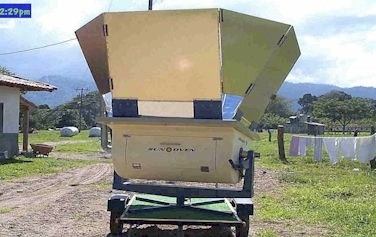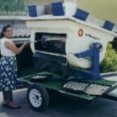To introduce the environmentally friendly concept of solar baking while providing opportunities for women to gain their own income
By loading the map you accept the privacy policy of Google.
 This project initiated by UNEP/Wuppertal Institute Collaborating Centre on Sustainable Consumption and Production (CSCP) aimed to implement a pilot bakery that meets the need for fresh, locally baked bread and at the same time reduce the price for the consumers. Since its opening in 2009 the installed solar oven provides 200 rural families with fresh and lower priced bread. Furthermore employment for 7-10 engaged and skilled women was created, which have now the opportunity to earn their own income and improve the living standards of their families.
This project initiated by UNEP/Wuppertal Institute Collaborating Centre on Sustainable Consumption and Production (CSCP) aimed to implement a pilot bakery that meets the need for fresh, locally baked bread and at the same time reduce the price for the consumers. Since its opening in 2009 the installed solar oven provides 200 rural families with fresh and lower priced bread. Furthermore employment for 7-10 engaged and skilled women was created, which have now the opportunity to earn their own income and improve the living standards of their families.
Background
In Cameroon nearly all bakeries are located in the cities, only one percent of all bakeries are located in rural areas. This is why bread must currently be delivered over long distances to the rural regions. Baking goods are not always available and typically not fresh when they arrive in the countryside. Moreover, the delivery adds to the cost of the bread, which means that rural people have to pay more for less preferable bakery products. The Cameroon Sustainable Sun Bakeries Project addressed this problem by establishing a self-sustaining bakery enterprise in the rural area of Buea, using solar power as energy source. The Program initiated by UNEP/Wuppertal Institute Collaborating Centre on Sustainable Consumption and Production (CSCP) aimed to implement a pilot bakery that meets the need for fresh, locally baked bread and at the same time reduce the price for the consumers. Furthermore the sun bakery created employment for women who run the bakery and prepare, bake, sell, and deliver the goods. To ensure long term sustainability and up-scaling of the pilot project it was intended to install a revolving fund where parts of revenues can be reinvested into new bakeries in the future. In the first phase of the project the village Nguti was identified as suitable location and a detailed business plan for the bakery and potential expansion was developed. The next step was to select women who were motivated to run the bakery. These women were trained by local experts so that they were able to operate and manage the bakery business. Following the solar oven was purchased from a producer in the USA. After longer negotiations on the import conditions and duty, the oven was shipped directly to Nguti and than set up in the village. During and after the implementation the project progress was evaluated and monitored by CSCP.Technology, Operations and Maintenance
The solar oven that was installed in Nguti is the "Villager Sun Oven®“ which is manufactured and sold by Sun Ovens International Inc., USA. This means the technology had to be imported and no local materials were used. On the other hand, the technology is already proven and of high quality which ensures long term use and a good performance. The oven is designed to produce baking goods in large quantities within a short period of time. The baking temperatures reached are about 260°C without requiring any fuel but the sun. To concentrate the solar radiation rugged aluminum panels are used as heat collectors. From here the captured energy is directed to the oven container where the goods are baked. The only frequent maintenance activity required to keep the solar oven functional is to grease the rod which is used to adjust the oven to the sun. In areas with a lot of dust the reflector and glass may also need to be cleaned several times a day to ensure high performance of the oven.Financial Issues and Management
The procurement of the solar oven itself was linked to high initial costs of about €10,000 as the technology had been bought and shipped from the USA. Once the bakery started, its operation is economically viable. Being aware of the high initial costs and its effects on up-scaling the project, it was intended to establish a revolving fund within the project. The aim was to save a portion of sales revenues and reinvest the money to set up additional bakeries in the future. But the fund had not been established at the official end of the project. Important factors that still need to be observed are the size of the fund, mode of lending money, interest rates, the duration of repayment, etc.. With regards to the local value chain the pilot project created employment and offered the chance for local value creation. The money spent on bakery goods is now staying in the area and helps local women to become financially independent.Environmental Issues
Currently, baking in Cameroon is mainly done in ovens that are fuelled by charcoal. During the combustion process harmful greenhouse gases are released into the atmosphere with the known negative effects on the environment. In theory the implemented solar oven can replace about 150 tonnes of firewood each year, if used for 250 families under ideal conditions. This would results in CO2 emissions savings of up to 277.5 t annually, according to the producer. As no exact figures and calculations for the local charcoal reduction exist, only a rough estimate of savings of 140 – 200 t CO2 can be given. - Such cuts in firewood consumption can also help to reduce the pressure on local forest resources. So in the long term, the expansion of this program can make substantial contributions to the avoidance of deforestation and cutting greenhouse gas emissions.Social Issues
The projected offered rural women new income opportunities and the chance to learn entrepreneurial and other new skills. Previous to the project most of these women derived only little income from the sale of fruits and vegetables on the local market. The project design with the combination of capacity building and business development empowered women to improve their living standards. Moreover the produced bread provides an additional food staple at an affordable price. This improved and diversified the nutrient supply in the rural community.Results & Impact
 Since its opening in 2009 the installed solar oven provides 200 rural families with fresh and lower priced bread. Furthermore employment for 7-10 engaged and skilled women was created, which have now the opportunity to earn their own income and improve the living standards of their families. – The bakery is also getting a lot of attention and visits from abroad and serves as running demonstration project.
Since its opening in 2009 the installed solar oven provides 200 rural families with fresh and lower priced bread. Furthermore employment for 7-10 engaged and skilled women was created, which have now the opportunity to earn their own income and improve the living standards of their families. – The bakery is also getting a lot of attention and visits from abroad and serves as running demonstration project.
Replicability
In theory a solar bakery with this technology can provide baked goods for up to 250 families. With Cameroon's current population of 17.3 million people, there is potential for over 11,000 additional rural bakeries without causing serious competition to established bakery operations. Major obstacle for the widespread dissemination will clearly be the high initial cost for the imported solar ovens.Lessons learned
During the planning and implementation of the solar bakery in Cameroon, the strengths but also the critical factors within the project design became obvious. The lessons learned can be leveraged for improvements for further implementations. During the project implementation, communication problems between the partners due to bad connectivity were one of the most determining factors. To solve this problem an implementation plan and templates were developed by CSCP on how the project should progress. Next to that it took a long time to get a tax exemption for the oven. Both problems resulted in a slower progress of the implementation. After measures were taken and import question was solved, the project progressed on time. One other important factor was stakeholder awareness-raising to ensure engagement and involvement. On the one hand policy makers have to be ready to support the project on the other hand also educational institutions should be involved. The role of the educational institutions is to train local technicians, who can replicate, maintain and improve the technology for the local market. Equally important are follow up activities after the project was officially handed over to the community. These activities can sustain the project, support replication in other areas and help to develop entrepreneurial sprit in the local communities.Projects with same technology
Solar Food Processing (Phase II)
Solar Food Processing and Conservation (Phase I)
Projects in same country